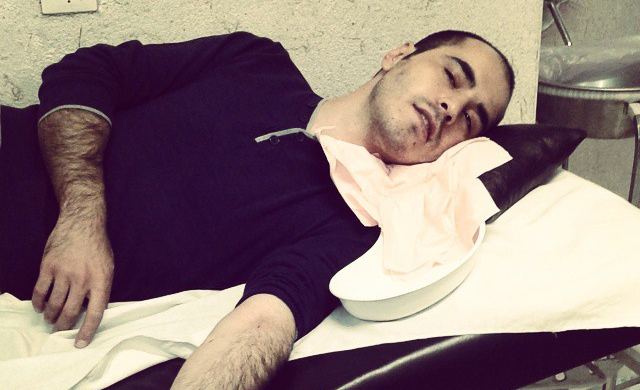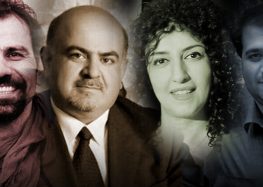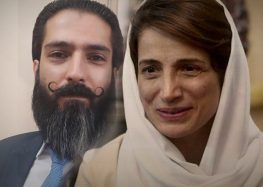Hunger Striker in Critical Condition Vows to Continue Strike

Political Prisoner Protests His Imprisonment and Denial of Medical Care
Prisoner of conscience Hossein Ronaghi Maleki, who has been on dry and wet hunger strikes since March 26, 2016 to protest being denied crucial medical treatment, is in critical condition, but has vowed to continue until his situation changes.
His mother, who visited Maleki in Evin Prison on April 10, said that the food and liquid deprivation has made her son, who is suffering from kidney disease, dangerously weak.
“I swear to God, Hossein looked very thin,” Zoleikha Mousavi told the International Campaign for Human Rights in Iran. “His skin looked yellow and pale. I’m terrified that something might happen to him.”
“On Tuesday [April 12], they transferred him out of the prison to be checked by a specialist,” she told the Campaign. “The doctor said he’s in critical condition and should end his hunger strike as soon as possible.”
“But Hossein says he won’t stop until his situation changes,” added Mousavi. “If anything happens to my son, officials will be held accountable.”
Mousavi said that she and her husband, Ahmad Ronaghi Maleki, had gone to the prosecutor’s office in Tehran every day for a week but the officials refused to provide a clear solution for resolving the situation.
“After seven years in prison, I want my son to be free,” said Mousavi. “He has done enough time. He has lost one kidney and is in pain from new diseases.”
“He should be conditionally released. I beg the authorities to let my son go,” she said. “I swear to God, he is not well.”
Political prisoners in Iran are singled out for particularly harsh treatment, which often includes denial of medical care, in direct violation of Iran’s own laws and prison regulations.
While in prison, Maleki has suffered digestive track, breathing and kidney problems. He has also undergone several surgeries.
He was granted medical furlough on June 14, 2015 upon posting bail in the amount of 4 billion rials (about $132,000 USD), but was returned to prison before his treatment was completed on January 20, 2016.
“I knew he would get worse when he was taken back to prison,” said Mousavi. “Even the doctors in the prison clinic repeatedly said they don’t have the necessary facilities to treat prisoners like Hossein.”
“Isn’t seven years in prison enough for a young man?” she said.
Maleki’s father began his own hunger strike in front of Evin Prison on April 9, 2016 to bring attention to his son’s plight. But Mousavi urged her elderly husband to end his strike soon after.
“After two days, I noticed my husband was in really bad shape,” she said. “It was hot outside and he’s an old man. I begged him to end his hunger strike. I told him I would be helpless if something happened to our son in prison.”
“I gave him some water and he broke his hunger strike in front of Evin Prison,” Mousavi told the Campaign. “We don’t know what else to do to make the authorities listen.”
Hossein Ronaghi Maleki, 30, was sentenced to 15 years in prison in 2009 by Judge Yahya Pirabbasi for his peaceful activities following Iran’s widely disputed presidential election that year. He was charged with “acting against national security” and “supporting and receiving money from foreign organizations.”
Following the recent prisoner swap between Iran and the United States, which resulted in the release of four detained Iranian-Americans, Maleki’s father asked why Iranian political prisoners who don’t hold dual citizenship remained unjustly incarcerated.
“As a father I want my son to be free, too,” Ahmad Ronaghi Maleki told the Campaign in January 2016.
“All these years I have been running around shouting for my son’s freedom so that someone might hear me,” he said.






